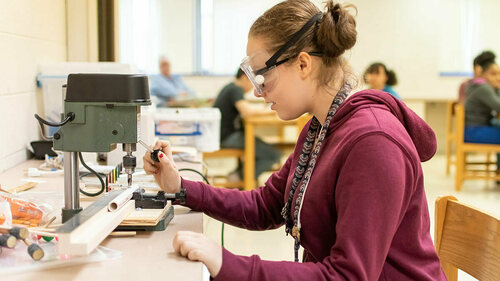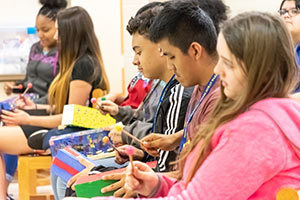
With help from the University of Notre Dame, students at Roosevelt STEAM Academy and Pierre Moran Middle School spent several months this semester building instruments and composing music as part of STEM+Music, an educational program of the Center for Civic Innovation (CCI) and DeBartolo Performing Arts Center at Notre Dame.
Working from kits developed by South Bend Woodworks, the Elkhart Community Schools students used math, science and engineering to design and build whistles, chimes and wooden drums, then composed original music for the instruments alongside Jay Brockman, director of CCI; Juan-Carlos Alarcon, music education student at Indiana University South Bend and former Pierre Moran student; and Wendy Daly of The Music Village in South Bend.
On Friday (May 3), the students — 11 from Roosevelt and 25 from Pierre Moran — will channel that work into a special performance at Pierre Moran with Third Coast Percussion, a Grammy Award-winning quartet of classically trained percussionists from Chicago.
Doors will open at 5:30 p.m. and the performance will begin at 6 p.m. A reception will follow and include posters and other displays with further information about the program.
For the performance itself, the students will contribute a series of recurring musical phrases, or motives, to an original composition by Third Coast, which recently concluded a five-year residency with the DeBartolo Performing Arts Center based around music-making and community outreach.
“People often think of artists and musicians as being very different from engineers and scientists, but in reality they have a lot in common in the ways that they solve problems,” said Brockman. “Students in this program get to experience how creativity, experimentation and analysis apply to both the STEM fields and the arts.”
Established in 2013, STEM+Music began as an opportunity for local elementary school students to visit Notre Dame and learn about sound waves and musical instruments while playing with Third Coast on custom instruments designed by the ensemble in collaboration with students and faculty from the College of Engineering.

From there, it expanded to include Common Denominators, a program for third- and fourth-grade students at Roosevelt, as well as eighth-grade students at Pierre Moran, that emphasizes the use of fractions in composing rhythms. The program also was used at Madison STEAM Academy in South Bend this year.
In designing the chimes and whistles with materials and tools including aluminum and PVC tubing and a 3D printer, the Pierre Moran students also explore proportional relationships, graphing and linear equations, all key components of the grade eight math standards in Indiana.
Funding for the Common Denominator program comes in the form of a 21st Century Community Learning Center grant for before- and after-school programming at both Roosevelt and Pierre Moran, as well as a School Improvement Grant for Pierre Moran alone, both from the Indiana Department of Education.
This is the third year for the program after an initial pilot year.
“The objective is to enhance (students’) math skills,” Tonda Hines, 21st Century Program manager for Elkhart Community Schools, said of the program.
At the same time, Hines said, evidence suggests the program may be having a positive effect on reading scores as well, in addition to fostering positive relations among students and between students and teachers.
The Pierre Moran students got a glimpse of Third Coast during the ensemble’s performance with the composer Philip Glass at the DeBartolo Performing Arts Center in March, Brockman said, and had a chance to rehearse with them at their school before the concert.
“I loved rehearsing with Third Coast Percussion,” said Emily Garcia Reyes, a student at Pierre Moran. “Also, learning the pentatonic scale and how to calculate frequencies helped me with my math classes.”
Ana Hernandez Botello said that she likes the class a lot, and that she gets to “let out some energy during the day.”
And while many of the Roosevelt students are too young to fully appreciate the opportunity, Hines said, “They know it’s important and are valuing the experience.”
“I think for them, personally, it’s an experience they’ll look back on” fondly, she said.
Brockman, for his part, hopes to share that experience with as many students as possible.
To that end, he currently is working with South Bend Woodworks to standardize the Common Denominator program and replicate it nationwide with support from a National Science Foundation grant.
“Two years from now,” he said, “I would love to see 100 schools doing this.”
Contact: Jay Brockman, director, Center for Civic Innovation, 574-631-8810, jbb@nd.edu